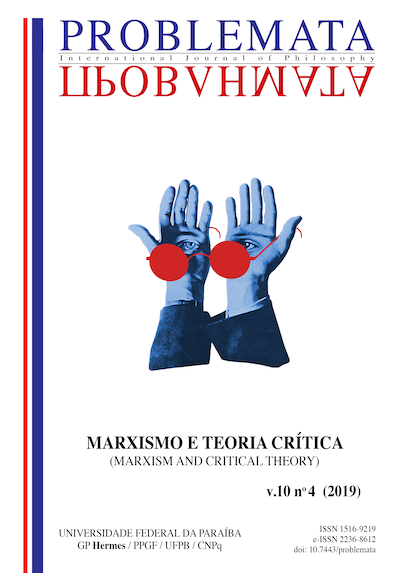THE SOCIAL CRHYSALIS OF VALUE:
LABOUR, COMMODITY AND EQUIV ALENT
DOI:
https://doi.org/10.7443/problemata.v10i4.49678Keywords:
Marx, Commodity, Value, Equivalent, Abstract labourAbstract
The aim was to analyse how the relations between commodities, within the society where the capitalist mode of production prevails, manifest the social wealth and constitute themselves as parameters for the determination of value. In this sense, taking as reference the four forms of value presented by Karl Marx in Capital (elementary or accidental form of value; total or expanded form of value; the general form of value; and the money form), was examined the transition from the relative quality of value to its position of economic sovereignty. It was also intended to distinguish historical and logical peculiarities from this dynamic, as well to indicate impacts that metamorphose labour, and to raise its abstract quality to social validity.
Downloads
References
ENGELS, F. Karl Marx, a contribution to the critique of political economy. In: MARX, K.; ENGELS, F. Collected Works, Vol. 16. London: Lawrence & Wishart, 2010.
HEINRICH, M. An introduction to the three volumes of Karl Marx’s Capital. Vol. 1. New York: Monthly Review Press, 2004.
HOLLOWAY, J. Read Capital: the first sentence or, Capital starts with wealth, not with commodity. Historical Materialism Journal, v. 23.3. London, p. 03-26, 2015.
MANDEL, E. Iniciação à teoria económica marxista. Lisboa: Antídoto, 1978.
MARX, K. Capital: a critique of political economy. Vol. I. In: MARX, K.; ENGELS, F. Collected Works, Vol. 35 (Karl Marx – Capital Volume I). London: Lawrence & Wishart, 2010a.
______. Preface to the first German edition. In: MARX, K.; ENGELS, F. Collected Works, Vol. 35 (Karl Marx – Capital Volume I). London: Lawrence & Wishart, 2010b.
______. Economics Manuscripts of 1857-58 (First Version of Capital). In: MARX, K.; ENGELS, F. Collected Works, Vol. 28 (Marx 1857-61). London: Lawrence & Wishart, 2010c.
______. Marx to Engels. 22 July 1859 (letter). In: MARX, K.; ENGELS, F. Collected Works, Vol. 40 (letters 1856-59). London: Lawrence & Wishart, 2010d.
______. Value, price and profit. In: MARX, K.; ENGELS, F. Collected Works, Vol. 20 (Marx and Engels 1864-68). London: Lawrence & Wishart, 2010e.
______. Value, price and profit. In: MARX, K.; ENGELS, F. MEGA (Marx-Engels-Gesamtausgabe), Inhaltsverzeichnis I/20 (Karl Marx - Friedrich Engels.
Werke, Artikel, Entwürfe – Sep. 1864 bis Sep. 1867). Amsterdam: International Instituut voor Sociale Geschiedenis, 2003.
______. Lohn, Preis und Profit. In: MARX, K.; ENGELS, F. Werke, Bd. 16. Berlin: Dietz Verlag, 1962.
MOURA, M. C. B. de. Sobre o projeto de crítica da economia política de Marx. Revista Crítica Marxista, São Paulo, n. 9, 1999.
MÜLLER, M. L. Exposição e método dialético em O Capital. Boletim SEAF, Belo Horizonte, v. 2, p. 17-41, 1983.
RUBIN, I. I. A teoria marxista do valor. São Paulo: Brasiliense, 1980.
Downloads
Published
Issue
Section
License
Authors who publish with this journal agree to the following terms:
- Authors retain copyright and grant the journal right of first publication with the work simultaneously licensed under a Creative Commons Attribution License that allows others to share the work with an acknowledgement of the work's authorship and initial publication in this journal.
- Authors are able to enter into separate, additional contractual arrangements for the non-exclusive distribution of the journal's published version of the work (e.g., post it to an institutional repository or publish it in a book), with an acknowledgement of its initial publication in this journal.
-
- Authors are permitted and encouraged to post their work online (e.g., in institutional repositories or on their website) prior to and during the submission process, as it can lead to productive exchanges, as well as earlier and greater citation of published work (See The Effect of Open Access).





